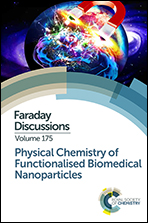The interplay of density functional selection and crystal structure for accurate NMR chemical shift predictions
IF 3.3
3区 化学
Q2 CHEMISTRY, PHYSICAL
引用次数: 0
Abstract
Ab initio chemical shift prediction plays a central role in nuclear magnetic resonance (NMR) crystallography, and the accuracy with which chemical shifts can be predicted relative to experiment impacts the confidence with which structures can be assigned. For organic crystals, periodic density functional theory calculations with the gauge-including projector augmented wave (GIPAW) approximation and the PBE functional are widely used at present. Many previous studies have examined how using more advanced density functionals can increase the accuracy of predicted chemical shifts relative to experiment, but nearly all of those studies employed crystal structures that were optimized with generalized-gradient approximation (GGA) functionals. Here, we investigate how the accuracy of the predicted chemical shifts in organic crystals is affected by replacing GGA-level PBE-D3(BJ) crystal geometries with more accurate hybrid functional PBE0-D3(BJ) ones. Based on benchmark data sets containing 132 13C and 35 15N chemical shifts plus case studies on testosterone, acetaminophen, and phenobarbital, we find that switching from GGA-level geometries and chemical shifts to hybrid functional ones reduces 13C and 15N chemical shift errors by ~40-60% versus experiment. However, most of the improvement stems from the use of the hybrid functional for the chemical shift calculations, rather than from the refined geometries. In addition, even with the improved geometries, we find that double-hybrid functionals still do not systematically increase chemical shift agreement with experiment beyond what hybrid functionals provide. In the end, these results suggest that the combination of GGA-level crystal structures and hybrid-functional chemical shifts represents a particularly cost-effective combination for NMR crystallography in organic systems.准确预测核磁共振化学位移的密度泛函选择与晶体结构的相互作用
Ab initio 化学位移预测在核磁共振(NMR)晶体学中起着核心作用,相对于实验而言,化学位移预测的准确性影响着结构分配的可信度。对于有机晶体,目前广泛使用的是采用规包括投影增强波(GIPAW)近似和 PBE 函数的周期密度泛函理论计算。以前的许多研究都探讨了使用更先进的密度泛函如何提高预测化学位移相对于实验的准确性,但几乎所有这些研究都采用了用广义梯度近似(GGA)泛函优化的晶体结构。在此,我们研究了用更精确的混合函数 PBE0-D3(BJ) 晶体几何结构取代 GGA 水平的 PBE-D3(BJ) 晶体几何结构会如何影响有机晶体中预测化学位移的准确性。基于包含 132 个 13C 和 35 个 15N 化学位移的基准数据集以及关于睾酮、对乙酰氨基酚和苯巴比妥的案例研究,我们发现从 GGA 水平的几何图形和化学位移转换到混合功能几何图形和化学位移,13C 和 15N 化学位移误差比实验误差减少了约 40-60%。然而,大部分的改进源于使用混合函数进行化学位移计算,而不是源于改进的几何结构。此外,即使改进了几何结构,我们发现双杂交函数仍然不能系统地提高化学位移与实验的一致性,而超过混合函数所提供的结果。最后,这些结果表明,将 GGA 级晶体结构和混合函数化学位移结合起来,是有机体系核磁共振晶体学中特别经济有效的组合。
本文章由计算机程序翻译,如有差异,请以英文原文为准。
求助全文
约1分钟内获得全文
求助全文
来源期刊

Faraday Discussions
化学-物理化学
自引率
0.00%
发文量
259
期刊介绍:
Discussion summary and research papers from discussion meetings that focus on rapidly developing areas of physical chemistry and its interfaces
 求助内容:
求助内容: 应助结果提醒方式:
应助结果提醒方式:


